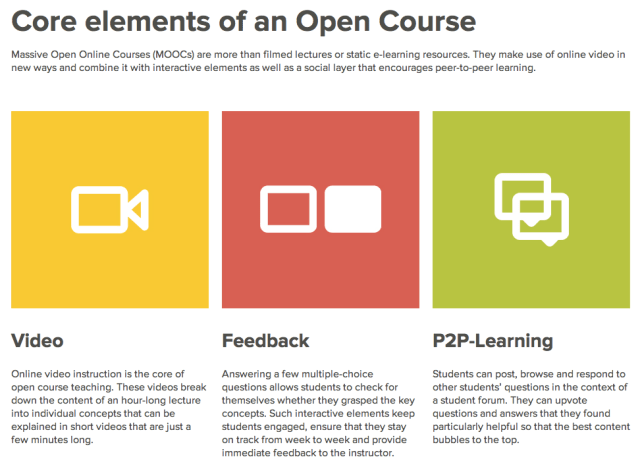The fast expanding universe of MOOCs has a new addition. Berlin-based startup iversity, founded in 2011 to offer online collaboration tools for learning management, has relaunched itself as a platform for massive open online courses. Its first batch of MOOCs are due to go live around September/October, at the start of the winter study term, with a view to steadily expanding the number of courses offered on its platform and ramping up student numbers from the initially expected six-digits.
Course content will be provided by universities and individual professors — assuming iversity can convince Europe’s educators that MOOCs are the future and that its platform is the place to rethink their approach to education delivery. iversity won’t be creating any courses itself, so it needs others to buy in. Its first task is therefore to educate continental Europe about the MOOCs phenomenon and the “revolution” taking place in the U.S., says CEO Marcus Riecke.
Continental Europe is arguably lagging the U.K. too. The U.K.-based Futurelearn MOOC consortium, formed last December, is now backed by 19 institutions and plans to launch its first courses in mid 2013. “It’s early days [for MOOCs in continental Europe],” says Riecke, a former VP at eBay Europe who has also held senior roles at Yahoo and Monster. “MOOCs are still oddly a bit of an insiders’ topic and the majority of folks both in the education sector and the Internet sector haven’t yet heard about it.
Everything that is university today is very much on the cusp of disruption… much like the publishing industry was 10 years ago
“Continental Europe compared to the U.K. — not to mention the U.S. — is probably six months behind, in terms of the awareness of the phenomenon so the first thing we’re hoping to achieve is to put this conversation onto the agenda. That’s not the case today. It’s really even more of an insider discussion in continental Europe. Very few people are dabbling in this today.”
In order to encourage institutions and academics to kickstart its platform business, iversity has launched a competition — under the grand title of MOOC Production Fellowship and in partnership with German education think tank Stifterverband — asking for MOOC concepts to be submitted. The competition runs to the end of April. Ten winners will be chosen and will each receive a grant of €25,000 to produce their course in time for iversity’s inaugural winter term.
How did iversity’s pivot come about? “About six months ago the founders and I, who wasn’t part of the team at the time, became fascinated by all the stuff that had been going on in the U.S.,” Riecke tells TechCrunch, specifically name-checking the Coursera, Udacity and edX MOOCs platforms. “We became convinced that the MOOCs phenomenon is not just your regular hype but a very substantive trend or new business that’s emerging.”
“I think everything that is university today is very much on the cusp of disruption… much like the publishing industry was 10 years ago,” he adds. “And that’s why we got together and we raised a new round at the end of last year with the existing investors and T-Venture, the venture capital arm of Deutsche Telekom and I came on board and we decided to relaunch iversity as the leading MOOC platform in Europe.”
While iversity will be open to hosting MOOCs submitted by professors or institutions from anywhere in the world, operating from a continental European base gives it an obvious first focus on Europe. And while Coursera and other U.S. MOOCs platforms are open to courses from institutions outside the U.S. — indeed, Coursera already counts several European and international institutions among its 62 university partners — iversity has the feet on the ground to build strong connections with European universities and professors, argues Riecke.
“Clearly the American companies have a time advantage… but there is one critical piece in this particular business as it is beginning to emerge — and that’s your local or your regional connections into your content community [ie university professors],” says Riecke. “It’s certainly feasible that it might be a little more difficult for Coursera from Palo Alto or Mountain View to be quite as close to universities on the ground in Europe as we are.”
The continental European education landscape is also different to the North American one — with generally greater access to higher education and at lower cost — which means iversity will be tweaking its business model to better tailor it to specifically European educational realities.
According to Riecke, iversity is looking at three likely business models:
- certification fees for students — these won’t be implemented this year, says Riecke, but will be coming to iversity in 2014
- licensing fees — where physical universities pay iversity to license courses to replace some of the classes they conduct (likely for introductory courses, freeing the university’s staff up for more in-depth teaching)
- recruiting fees — generated by providing a “recruiting intelligence” service to employers based on students’ performance in relevant classes
iversity is not disclosing its total funding level to-date — but prior to its latest round had raised $1.7M, according to Crunchbase — but Riecke says it has enough funding to deliver a “proof of concept” first handful of MOOCs this year. After which, he says it will look to raise another round towards the end of the year.
“Once we have the first 10 courses — starting is always the most difficult thing if you’re a platform business — then we hope to expand from the initial set of 10 courses to possible 30, 50 and the sky’s the limit after that,” Riecke adds.
iversity’s existing investors include BFB Frühphasenfonds Brandenburg, bmp media investors AG and the Business Angel Masoud Kamali.
Here’s how iversity describes the key ingredients of a MOOC on its website:

